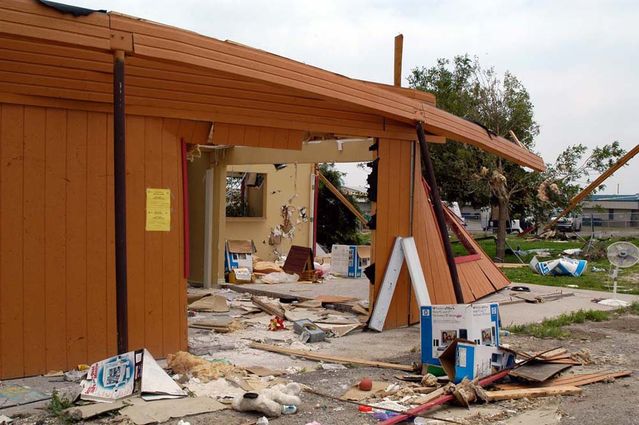Does Climate Change Cause Disasters?
Human-caused climate change affects the weather, but this is not the disaster.
by Ilan Kelman Ph.D.Does climate change create or worsen disasters? Science answers “not really”. The evidence provides a slightly different conclusion from many of the headlines screaming disaster doom and gloom from human-caused climate change.

The reasoning comes from definitions. Climate change is defined as a change in weather statistics. Storms, air temperatures, floods, precipitation, droughts, and wildfires/bushfires are now being affected by human-caused climate change, in some cases substantially. The definition of “disaster”, though, is that people, our infrastructure, or our livelihoods must be affected. The weather is not always hazardous, unless we cannot deal with it.
This element of humanity and our constructions having trouble due to the weather is vulnerability. Disasters are caused by vulnerabilities when people make choices, or are forced to make choices or do not have choices, that stop us dealing with weather, no matter how extreme.
Perhaps we enjoy the recreation and views afforded by living next to a river. A fair enough choice, but then we should not be surprised when the river floods. If we have not prepared our dwelling and our lives to deal with river water safely, then our choices, not the river’s behaviour, have led to a disaster.
More commonly and more insidiously, people live by a river because it is the only place they can afford. Or they might be forced to live there in order to work as an agricultural labourer on the farm which has rich soil due to it being on a floodplain. They do not have the money to improve the flood resistance of their abode, to buy insurance, or to lose wages by evacuating as the waters rise. Social norms might not permit women to leave their house on their own or might accept harassment and violence in public shelters.
This remains disaster by choice, but people are vulnerable because of someone else’s choice. Although human-caused climate change is our choice—with the more affluent minority choosing it for the less affluent majority—neither the climate nor the weather make vulnerability choices for us.
Cultural systems forging inequity and discrimination are exactly that: cultural systems, not climate systems. These vulnerabilities set the stage for disasters, irrespective of what climate change does to the weather or to the river. If we wish to avoid disasters, then we need to tackle the societal processes and values producing vulnerability, not focus on the hazards or the changing hazards.
As another example, storms including hurricanes, cyclones, typhoons, and polar lows are likely showing reduced frequency but increased intensity from human-caused climate change. They might be slowing as they move along their tracks, meaning that more rain can be dumped in one place. But we should be able to deal with wind, rain, freshwater flooding, and storm surge—even if more intense due to human-caused climate change—considering that these tempests have been hitting us for millennia. If we are flooded or if our infrastructure is damaged by wind, then any storm could have done the same, irrespective of climate change.
Climate change alone cannot be said to cause, exacerbate, make, or increase disasters. With some exceptions and these exceptions produce major problems for us.
Heat-humidity combinations are a huge concern. Typically, heat waves kill because people cannot afford to cool their property or cannot hydrate enough and they cannot go elsewhere to cool down or to hydrate. Human-caused climate change is projected to produce heat-humidity combinations in which much outdoor labour is lethal. Meanwhile, staying in shade or indoors will be difficult because the air will not cool down enough at night to permit our bodies to recover from overheating.
Across large areas, our choice will be staying indoors with cooling (at least, during the day, with outdoor work perhaps possible overnight), abandoning the location, or huge mortality. Projected heat-humidity-related disasters caused by climate change are terrifying.
Changes to the oceans, too, might be disasters attributable to climate change. Sea-level rise from human-caused climate change has three main processes.
First, melting land-based snow, ice, and permafrost are raising sea level by several millimetres per year. Second, oceans absorb heat from the warming air and the water expands, which will raise sea level by several centimetres per year, starting over the next few decades. These contributions to sea-level rise are not extensive and, before 2100, do not seem likely to bring sea level above its maximum since the last ice age ended.
The real challenge is the third factor. Ice sheets, most prominently in Greenland and Antarctica, might melt, potentially adding dozens of metres to sea level over centuries. Numerous cities and island countries would probably become entirely inundated, leading to drastic societal changes. While we have a long lead-time to plan for this scenario, and it could be managed effectively if we choose, the loss of or major changes to so much inhabited land could rightly be termed a disaster from human-caused climate change.
Additionally, oceans absorb carbon dioxide from the air, which is rising in concentration due to our actions and which combines with water to form acid. This increased acidity affects marine ecosystems and might especially harm corals and some beach types. Without a reef protecting the shore from the sea’s wave power, some islands and shorelines could erode rapidly, leading to disasters in which settlements must scramble to get out the way of the encroaching ocean.
Apart from these exceptions—which are big enough to be reasons themselves for tackling human-caused climate change—our known impacts on the climate cannot be blamed for causing disasters, even when hazards are substantially worsened. The disaster comes from vulnerability and we can choose to tackle vulnerability for avoiding disasters—or we can choose otherwise.
These choices are not influenced by climate change. They are entirely up to us.